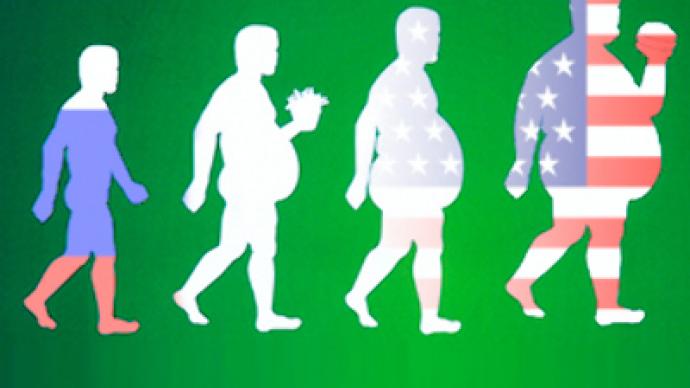Are Russians the healthiest people on the planet?

For just a moment, cast aside your notions of a lawless, littered land of deadbeats and drunks, and consider this: Russia leads the pack in two cool categories: organic food and small jeans.
First, this writer fully understands the extreme challenge of attempting to prove in 1,000 words or less that Russians are the “healthiest people on the planet,” especially when the average lifespan of a Russian male is in the ballpark of just 60 years, and cigarettes are consumed like, well, vodka and bacon fat. Yes, this will definitely be difficult.
However, there is some good news: First, the robust Russian females can expect to live well beyond the age of 70. That’s good news because it suggests that the premature demise of their male counterparts must be explainable by other factors aside from health issues, such as ultra violence and accidents (In the mid 1990s, Russia had the highest accidental-death rate in the world, which mostly affected the males).
And then there was that white-knuckle rollercoaster ride of the 90s when Russia passed from state-sponsored communism to free-market capitalism literally overnight (which is what Vladimir Putin was partially alluding to when he called the collapse of communism “the greatest geopolitical tragedy of the century”). So not every death in Russia is the result of a life-long wrestling match with a bottle of vodka.
But even given these exceptions, is it really possible to suggest that Russians are the healthiest people in the world? Yes, I believe it is, and the figures have a nice way of speaking for themselves. A visitor to Russia might even be forgiven for wondering out loud why blue jeans mysteriously start to shrink in size as one travels in a counter-clockwise direction around the globe (Why the prices for the smaller jeans don’t shrink proportionately as well is a completely different question). This is something Kipling never mentioned, of course, but his famous line from the Ballad of East and West, “East is East, and West is West, and never the twain shall meet” may have some merit here.
Of course, small jean sizes do not necessarily mean that all is well in the land, but it definitely means something. So is Russia the healthiest place on the planet? Well, why not? After all, it would be hard to name another industrial nation where the native population has a stronger attachment to the land than Russia. Starting in June, thousands of Russians ascend on the forests to collect mushrooms (a veritable art in itself, since eating the wrong mushroom could literally mean the difference between life and death), wild strawberries and an assortment of other delectables. And the age-old tradition of home cooking, with fresh products, many grown by hand, is still not a forgotten art in Russia.
For ages, Russia was an agrarian country and “this love for the soil is in the Russian blood,” commented a Russian friend. Not even Stalin’s brutal forced industrialization program in the 1920s could dash the Russians’ attachment to the land. Later, Russians were provided with a small patch of land outside of the cities where they could grow some extra food. The tradition is still alive and well today.
Yes, the French express a certain je ne sais quoi about their vineyards, and the Greeks go gaga over their gorgeous isles, but only the Russians can boast the pastoral dacha where millions of city dwellers escape from the urban madness (actually, many Russians still call the village home year round).
And it is at the idyllic dacha that the Russian people go to grow their gardens, breath some more or less fresh air and generally get ‘detoxed’ from the city. But this is only part of the story. Although many people around the world think that tilling the land and collecting food is a dreadful waste of time (especially in our convenient age of hyper-stores and mega-malls where carrots and computers share the same store space), Russians still cherish this time-honored tradition. More importantly, they truly think about what goes into their bodies.
Consider the debate over genetically modified foods [GM foods are organisms whose DNA have been altered through genetic engineering, which gives them longer shelf life]. While much of the planet is lining up with their food trays to taste these yummy Frankenstein foods (soybean, corn, canola, meat and dairy products), Russia is one of the few countries questioning their safety.
Prime Minister Vladimir Putin [then the president] was one of the few world leaders who was spearheading efforts for a better understanding of these modified foods. “American and Canadian products, which are, as a rule, genetically modified, are competing on the world agricultural market…” He added that, before suggesting a council to regulate food quality, “We must inform people about the hazards of GM products.”
Meanwhile, Vladimir Kuznetsov, head of the Institute of Plant Physiology at the Russian Academy of Sciences, told RIA Novosti that GM foods are dangerous because they are unpredictable. “Scientists do not know what effect they will have on the human body in the long term.”
According to an All-Russia Public Opinion Research center poll, 95% of Russians who have heard of GM foods would not buy them if they were labeled as such. Last year, RT reported on a protest against GM foods in Murmansk by the Nature and Youth group.
Pass the Freedom Fries
So the question is: Why is the mythical land of Superman and Wonder Woman morphing into the Incredible Bulk, at the same time Russia is squeezing itself into a Size 7? The answer can be found in America’s very own super-size-me diet and couch potato lifestyle. We Americans, generally speaking, sit more, drive more, and consume more pre-processed garbage than much of the world combined. But did we really believe that man was meant to get his food through an open window of his running car at the McDonald’s drive-thru? That is a tasteless recipe for utter disaster.
In America, it takes a conscious effort on the part of the individual to beat the battle of the bulge, especially when there are tens of thousands of fast food restaurants tempting them on a daily basis. Good health and a slim body does not come naturally. A person must join the gym, subscribe to a diet plan, read a mountain of literature and have a personal trainer in order to stay slim (which, incidentally, helps to fuel economic growth).
As Eric Schlosser, the author of “Fast Food Nation,” said, “No other nation in history has gotten so fat so fast.” But this next observation by Schlosser hits home the hardest: “Our children… recognize Ronald McDonald’s image easier than the face of Jesus Christ.”
Unfortunately, this is an issue that Russia cannot afford to ignore because America’s problems have a nasty way of becoming the world’s problems. Consider this: According to the CDC (Center for Disease Control and Prevention), obesity in US adults has increased by 60 percent within the past twenty years [an obese person is someone with a Body Mass Index (BMI) of 30 percent]. Meanwhile, obesity in children has tripled in the past thirty years. Today, about 44 million Americans are obese, while an additional 6 million rated “super-obese,” which mean the person is 100 pounds or more overweight. This is having a major impact on the national healthcare issue since obesity-related deaths have jumped to more than 300,000 a year, second only to tobacco-related deaths.
Now, you do not have to be a Sovietologist, sociologist or a dietician to jump to some conclusions from all of the empirical evidence: From 1917 until 1991, Russia was largely isolated from the influence of western civilization as it was stuck inside the hot crucible of communism. The western lifestyle was experienced by a tiny percentage of the Soviet population. Today, Russia has blossomed in the brilliant light of day into a full-fledged democracy. But it is conspicuously missing one thing: love handles, or what the French affectionately call poignees d’amour. In fact, a person could walk around a Russian city for days and never see a young child bursting his breeches. Aside from a relative handful of truly clinical cases, obesity is practically unheard of in Russia, and the Russians eat just as much, or more, than other people. What conclusion can we draw from this, especially when Russian probably consume just as much fat in their diets as their counterparts in the West?
What is to be done?
The question must be asked now before it’s too late: Is the Russian lifestyle superior to the American lifestyle? Or should we try to bring together the very best qualities of the two lifestyles, instead of pompously assuming that one is superior to the other? Many of the conveniences that we take for granted in the West (vending machines, processed food, mass entertainment, and a car for every person, for example) have only been just recently introduced in Russia.
In the United States and Europe, an overwhelming majority of the consumers (and boy do they consume) get their food from a supermarket or a hypermarket (the stores are getting meaner, but not leaner). These large agri-businesses want to maximize their profits as much as possible, of course. This means that products must contain unhealthy amounts of salt, sulfates, phosphates and other preservatives to keep the items 'fresh' on the store shelves. This rationale also paved the way, incidentally, to the need for GM foods.
Russians on the other hand (although the gap is closing quickly) get much of their produce from small stores, local markets and fruit and vegetable dealers. Much of the produce has gone directly from the land to the buyer with only the seller as a middle man.
But… there is a giant wave of obesity, underwritten by the western lifestyle, which is slowly engulfing the planet in its blubbery tentacles. Much of Europe is already showing the growing pains of its new liberal lifestyle (In the UK, obesity rates have doubled over the past 25 years; in Germany, which has the highest amount of overweight people in Europe, 75% of the men, and 59% of the women are overweight). And although fast food and hypermarkets in Russia are still in its infancy, Moscow already boasts 125 McDonald’s restaurants, as well as an assortment of other brands. Other big Russian cities are catching up fast. But this phenomenon has not hit the saturation point that it has in many western nations.
Today, many in the West understand the problem (for example, a group of Italians recently unveiled its ‘slow food’ program, which advises people on cultivating their own food, and preparing home cooked meals), but the Food Industry has become such a big part of modern life that the obesity issue will be with us for some time.
But for distant Russia, which has been spared the obesity onslaught due to ideology and geography, there is still time to take the appropriate measures.













